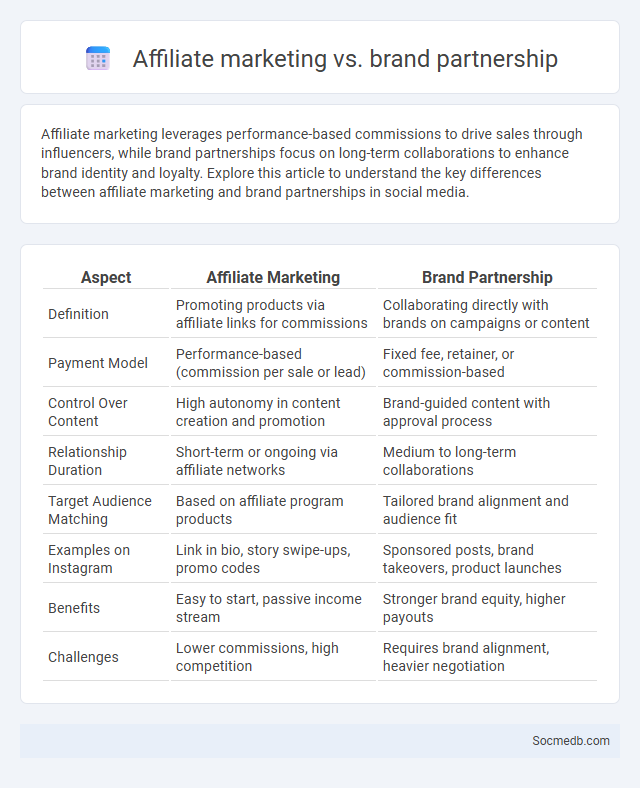
Photo illustration: Affiliate marketing vs brand partnership
Affiliate marketing leverages performance-based commissions to drive sales through influencers, while brand partnerships focus on long-term collaborations to enhance brand identity and loyalty. Explore this article to understand the key differences between affiliate marketing and brand partnerships in social media.
Table of Comparison
| Aspect | Affiliate Marketing | Brand Partnership |
|---|---|---|
| Definition | Promoting products via affiliate links for commissions | Collaborating directly with brands on campaigns or content |
| Payment Model | Performance-based (commission per sale or lead) | Fixed fee, retainer, or commission-based |
| Control Over Content | High autonomy in content creation and promotion | Brand-guided content with approval process |
| Relationship Duration | Short-term or ongoing via affiliate networks | Medium to long-term collaborations |
| Target Audience Matching | Based on affiliate program products | Tailored brand alignment and audience fit |
| Examples on Instagram | Link in bio, story swipe-ups, promo codes | Sponsored posts, brand takeovers, product launches |
| Benefits | Easy to start, passive income stream | Stronger brand equity, higher payouts |
| Challenges | Lower commissions, high competition | Requires brand alignment, heavier negotiation |
Introduction to Affiliate Marketing and Brand Partnerships
Affiliate marketing leverages your influence on social media to promote brands, earning commissions through tracked sales or leads generated from your unique affiliate links. Brand partnerships involve collaborating with companies to create authentic content that resonates with your audience, enhancing brand visibility and trust. Understanding these strategies helps maximize your online presence and monetize your social platforms effectively.
Defining Affiliate Marketing: Key Features and Models
Affiliate marketing involves promoting products or services through a network of partners who earn commissions based on performance, commonly tracked via unique affiliate links or codes. Key features include cost-effectiveness, performance-based rewards, and scalability across various social media platforms like Instagram, YouTube, and TikTok. Your success depends on selecting the right affiliate marketing model--such as pay-per-sale, pay-per-click, or pay-per-lead--tailored to your audience engagement and content strategy.
Understanding Brand Partnerships: Types and Approaches
Brand partnerships in social media encompass influencer collaborations, co-branded content, and affiliate marketing, each leveraging unique audience engagement strategies. Influencer collaborations harness the credibility and reach of individuals with niche followings, while co-branded content merges brand identities to appeal to wider demographics. Affiliate marketing integrates performance-driven tactics, incentivizing partners to promote products through tracked links and commissions, optimizing overall campaign ROI.
Core Differences Between Affiliate Marketing and Brand Partnerships
Affiliate marketing involves promoting products through unique tracking links, earning commissions based on sales or conversions, while brand partnerships are collaborative agreements where influencers or creators work directly with brands for mutual promotion and content creation. Affiliate marketing emphasizes performance-based rewards and individual sales tracking, whereas brand partnerships focus on long-term relationships, co-branded campaigns, and broader brand alignment. Social media platforms amplify both strategies, with affiliate marketing leveraging direct response tactics and brand partnerships enhancing brand awareness and influencer credibility.
Benefits of Affiliate Marketing for Businesses
Affiliate marketing significantly boosts business revenue by leveraging a network of influencers and content creators to promote products, resulting in increased brand visibility and customer engagement. This performance-based strategy reduces marketing costs as businesses pay only for actual conversions, enhancing return on investment (ROI). Additionally, affiliate marketing expands reach across diverse social media platforms, targeting niche audiences to drive qualified traffic and improve sales efficiency.
Advantages of Brand Partnerships for Brands and Influencers
Brand partnerships amplify your reach by combining audiences across social media platforms, driving higher engagement and authentic content creation. Collaborations enhance brand credibility and trust through influencer endorsements that resonate with specific target markets. Leveraging these strategic alliances boosts conversions and fosters long-term relationships, maximizing marketing ROI for both brands and influencers.
Revenue Models: Commission vs. Collaboration Fees
Social media platforms generate revenue primarily through commission fees, where a percentage of sales or transactions made via the platform is retained, and collaboration fees, which are fixed charges for partnerships or sponsored content. Commission models incentivize user engagement and direct sales, while collaboration fees provide predictable income streams from brand deals and influencer marketing contracts. Understanding these models helps you evaluate how social media monetizes content and supports long-term platform sustainability.
Suitability: When to Use Affiliate Marketing or Brand Partnerships
Affiliate marketing is ideal for businesses seeking cost-effective performance-based promotion, where commissions are paid only for actual sales or leads generated. Brand partnerships work best for long-term collaborations aiming to enhance brand awareness and loyalty through shared values and co-created content. Choosing between these strategies depends on campaign goals, target audience engagement, and desired control over brand messaging.
Challenges and Drawbacks of Each Strategy
Social media strategies often face challenges such as algorithm changes that limit organic reach, making consistent engagement difficult to maintain. Paid advertising requires careful budget management to avoid overspending without guaranteed returns, while content creation demands constant innovation to capture audience attention. You must also navigate privacy concerns and negative feedback that can quickly damage brand reputation if not handled properly.
Choosing the Right Approach for Your Marketing Goals
Selecting the right social media strategy depends on your specific marketing goals, whether it's brand awareness, lead generation, or customer engagement. Analyzing target audience behavior on platforms such as Instagram, LinkedIn, or TikTok ensures your content reaches the most relevant users. Tailoring your approach with data-driven insights boosts campaign effectiveness and maximizes return on investment.
 socmedb.com
socmedb.com